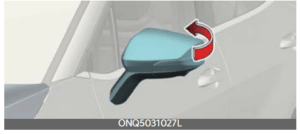Kia Sportage PHEV 2023 Steering Wheel and Mirrors
The 2023 Kia Sportage PHEV’s steering wheel and mirrors offer a symphony of functionality and control, making the car safer and more comfortable to drive. With its many easy-to-use controls, the multifunctional steering wheel puts the power of the car’s audio, communication, and driving support systems right at the driver’s fingertips. Additionally, the power-adjustable side mirrors, which come with heating elements and the ability to fold down, give the driver a better view of what’s going on around them, making the car more flexible and easy to use. The Sportage PHEV combines these features to show a dedication to ease of use, comfort, and safety. Every trip is a smooth and controlled experience inside the eco-friendly hug of this forward-thinking vehicle.
2023 KIA SPORTAGE Specs, Price, Features and Mileage (Brochure)
Steering wheel
The steering wheel of this vehicle is equipped with the Electric Power Steering (EPS) system.
Electric power steering (EPS)
Power steering uses the motor to assist you in steering the vehicle.
If the engine is off or if the power steering system becomes inoperative, the vehicle may still be steered, but it will require increased steering effort.
The EPS is controlled by the power steering control unit which senses the steering wheel torque and vehicle speed to command the motor.
The steering effort becomes heavier as the vehicle’s speed increases and becomes lighter as the vehicle’s speed decreases for better control of the steer-ing wheel.
Should you notice any change in the effort required to steer during normal vehicle operation, have the system checked by an authorized Kia dealer.
NOTICE
The following symptoms may occur during normal vehicle operation:
- When the ENGINE START/STOP button is the ON position, the steering wheel enters normal operation mode after diagnosing the Electric Power Steering system (for about 3 seconds).
- A click noise may be heard from the EPS relay after turning the ENGINE START/STOP button is turned to the ON or OFF position.
- If the steering wheel is operated when the vehicle is not in motion or driven at a low speed, you may hear some noise.
- If the Electric Power Steering system does not operate normally, the warning light will appear or blink on the instrument cluster. If the power assistance of steering fails, you will need to use more force to steer.
- Operating the steering wheel at lower temperatures may require more force and accompany noise. However, when the temperature increases, it returns to normal.
- Take your vehicle to an authorized Kia
dealer and have the vehicle checked as soon as possible. - When the charging system warning light comes on due to the low voltage (when the alternator or battery does not operate normally or malfunctions), the steering wheel may require increased steering effort.
- When jump-starting the vehicle after battery discharge, the steering wheel may not function properly. It is a temporary situation due to low battery voltage, and upon stable battery charging, the steering wheel will function normally again. Please move the steering wheel around to make sure the steering wheel is functioning properly before driving the vehicle.
- The steering effort can suddenly increase if the operation of the EPS system is stopped to prevent serious accidents when EPS control unit detects malfunction of the EPS system by self-diagnosis.
CAUTION
When you continuously operate the steering wheel, the overcurrent protection device is activated and it requires more force to operate the steering wheel. However, this doesn’t indicate a malfunction, and it works for your safety and will return to normal after some time.
CAUTION
If the Electric Power Steering (EPS) system does not work or an error occurs, the warning light on the instrument panel may be turned on or blink and it may require more force to operate the steering wheel. In this case, please hold the steering wheel more tightly than usual and operate with greater force. And then immediately pull your vehicle over to a safe place and have your vehicle inspected by an authorized Kia dealer.
Tilt & telescopic steering wheel
A tilt and telescopic steering wheel allows you to adjust the steering wheel before you drive. You can also raise it to give your legs more room when you exit and enter the vehicle.
The steering wheel should be positioned so that it is comfortable for you to drive, while permitting you to see the instrument panel warning lights and gauges.
WARNING
Steering wheel adjustment
Never adjust the angle and height of the steering wheel while driving. You may lose steering control.
Adjusting steering wheel angle and height
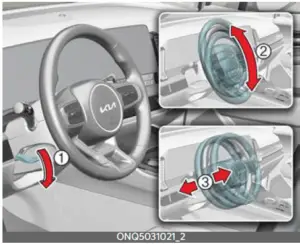
- To change the steering wheel angle, pull down the lock release lever (1).
- Adjust the steering wheel to the desired angle (2) and distance for-ward/back (3).
Move the steering wheel, so it points toward your chest, not toward your face. Make sure you can see the instrument panel warning lights and gauges. After adjusting, pull up the lock. - Pull up the lock-release lever to lock the steering wheel in place.
Push the steering wheel both up and down to be certain it is locked in position. - Be sure to adjust the steering wheel to the desired position before driving.
NOTICE
After adjustment, sometimes the lock-release lever may not lock the steering wheel.
It is not a malfunction. This occurs when two gears engage. In this case, adjust the steering wheel again and then lock the steering wheel.
CAUTION
While adjusting the steering wheel angle and height, please do not push or pull it hard since the fixture can be damaged.
Heated steering wheel (if equipped)
When the ignition switch or ENGINE START/STOP button is in the ON position, pressing the heated steering wheel button warms the steering wheel. The indicator on the button will appear.
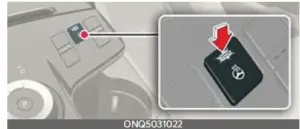
To turn the heated steering wheel off, press the button once again. The indicator on the button will turn off.
- The heated steering wheel defaults to the OFF position whenever the ignition switch or ENGINE START/STOP button is in the ON position.
NOTICE
The heated steering wheel will turn off automatically approximately 30 minutes after the heated steering wheel is turned on.
CAUTION
- Do not install any type of grip cover for the steering wheel, it may impair the function of the heated steering wheel system.
- When cleaning the heated steering wheel, do not use an organic solvent such as paint thinner, benzene, alcohol and gasoline. Doing so may damage the surface of the steering wheel.
- If the surface of the steering wheel is damaged by a sharp object, damage to the heated steering wheel components could occur.
WARNING
If the steering wheel becomes too warm, turn the system off. The heated steering wheel may cause burns even at low temperatures, especially if used for long periods of time.
Horn
To sound the horn, press the area indicated by the horn symbol on your steer-ing wheel (see illustration).
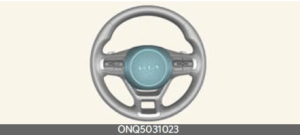
The horn will operate only when this area is pressed. Check the horn regularly to be sure it operates properly.
CAUTION
Do not strike the horn severely to operate it, or hit it with your fist. Do not press on the horn with a sharp-pointed object.
Mirrors
This vehicle is equipped with inside and outside rear-view mirrors to provide views of objects behind the vehicle.
Inside rearview mirror
Adjust the rearview mirror so that the centre view through the rear window is seen. Make this adjustment before you start driving.
Do not place objects in the rear seat or cargo area which would interfere with your vision out the rear window.
WARNING
Mirror adjustment
Do not adjust the rearview mirror while the vehicle is moving. This could result in loss of control.
NOTICE
Do not modify the inside mirror in any manner, including installing a wide mirror. Doing so could result in injury during an accident or deployment of the air bag.
CAUTION
Cleaning mirror
When cleaning the mirror, use a paper towel or similar material dampened with glass cleaner. Do not spray glass cleaner directly on the mirror. It may cause the liquid cleaner to enter the mirror housing.
Day/night rearview mirror (if equipped
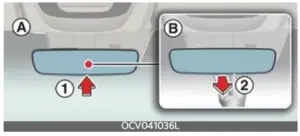
(A): Day, (B): Night
Make this adjustment before you start driving and while the day/night lever is in the day position (1).
Pull the day/night lever toward you (2) to reduce the glare from the headlamps of the vehicles behind you during night driving.
Remember that you lose some rear view clarity in the night position.
For KIA Connect button function:
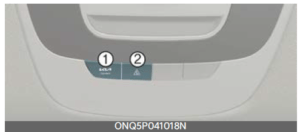
1 Kia Connect button
2 Roadside assist button
Electric Chromic Mirror (ECM) (if equipped)
The electric rear-view mirror automatically controls the glare from the headlamps of the vehicles behind you in nighttime or low-light driving conditions.
The sensor mounted in the mirror senses the light level around the vehicle and automatically controls the head-lamp glare from the vehicles behind you.
When the engine is running, the glare is automatically controlled by the sensor mounted in the rearview mirror.
Electric chromic mirror (ECM) with HomeLink씾 system (if equipped)
Electric Chromic Mirror (ECM) is that controls the glare from the headlamps of the vehicles behind you in nighttime or low-light driving conditions.
The sensor mounted in the mirror senses the light level around the vehicle and automatically controls the head-lamp glare from the vehicles behind you.
When the engine is running, the glare is automatically controlled by the sensor mounted in the rearview mirror.
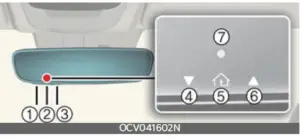
- HomeLink Channel
- HomeLink Channel
- HomeLink Channel
- Garage Door Opener Status Indicator:
Closing or Closed - HomeLink Operation Indicator
- Garage Door Opener Status Indicator:
Opening or Opened - HomeLink User Interface Indicator
Your vehicle may be equipped with a Gentex Automatic-Dimming Mirror with an Integrated HomeLink씾 Wireless Control System.
During nighttime driving, this feature will automatically detect and reduce rear-view mirror glare. The HomeLink씾 Universal Transceiver allows you to activate your garage door(s), electric gate, home lighting, etc.
Automatic-Dimming Night Vision Safety™ (NVS씾) Mirror (if equipped)
The NVS씾 Mirror automatically reduces glare by monitoring light levels in the front and the rear of the vehicle. Any objects that obstruct the light sensor will degrade the automatic dimming control feature.
For more information regarding NVS씾 mirrors and other applications, please refer to the Gentex website:
www.gentex.com
Your mirror will automatically dim upon detecting glare from the vehicles travelling behind you.
The mirror defaults to the ON position each time the vehicle is started.
Integrated HomeLink씾 Wireless Control System
The HomeLink씾 Wireless Control System provides a convenient way to replace up to three handheld radio-frequency (RF) transmitters used to activate compatible devices such as gate operators, garage door openers, entry door locks, security systems, and home lighting.
NOTICE
Considering the Home Security when the vehicle is parked outside the garage, the HomeLink will ONLY work when the ignition switch is in ACC position or ON position.
CAUTION
Before programming HomeLink to a garage door opener or gate operator, make sure that people and objects are out of the way of the device to prevent potential harm or damage. When programming a garage door opener, it is advised to park outside of the garage.
Do not use HomeLink with any garage door opener that lacks safety stop and reverse features as required by U.S. federal safety standards (this includes any garage door opener model manufactured before April 1, 1982). A garage door that cannot detect an object signalling the door to stop and reverse – does not meet current U.S. federal safety standards. For more information, con-tact HomeLink at www.homelink.com, or call HomeLink customer support at 1-800-355-3515.
It is also recommended that a new battery be replaced in the hand-held transmitter of the device being trained to HomeLink for quicker training and accurate transmission of the radio frequency.
- Programming HomeLink씾
The following steps show how to program HomeLink. If you have any questions or are having difficulty programming your HomeLink buttons, refer to the HomeLink website or call the HomeLink customer support toll-free number. Do this, before going back to the dealer who sold you the car.
- Visit the HomeLink website at:
www.homelink.com. Then at the top of the page, choose your vehicle make. Then watch the You Tube video, and/or access additional web-site information. - If you choose to access the website via your cell phone, scan the QR code.
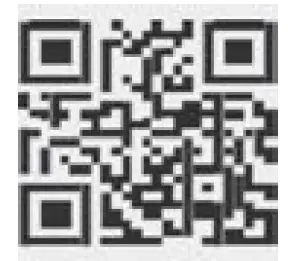
- Or, call HomeLink customer support at 1-800-355-3515
(Please have the vehicle make/model AND the opener device make/model readily available.)
- Programming Preparation
- When programming a garage door opener, it is advised to park the vehicle outside of the garage.
- It is recommended that a new battery be placed in the hand-held transmitter of the device being programmed to HomeLink for quicker training and accurate transmission of the radio-frequency signal.
- Place the ignition switch or ENGINE START/STOP button to the ACC
(Accessory) position for programming of HomeLink.
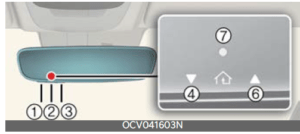
Programming a New Home-Link씾 Button
- Press and release the HomeLink button (1), (2) or (3), you would like to program. The HomeLink indicator light (7) will flash orange slowly (if not, perform the steps of “Erasing Home-Link Buttons” section, and start over).
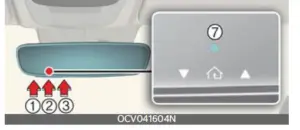
- Position the garage door opener 2. Position the garage door opener
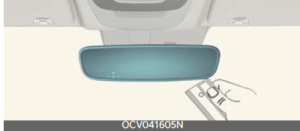
- While the HomeLink indicator light (7) is flashing orange, press and hold the hand-held remote button. Continue pressing the hand-held remote button until the HomeLink indicator light (7) light changes from orange to green. You may now release the hand-held remote button.
- Wait until your garage door comes to a complete stop, regardless of position, before proceeding to the next steps.
- Press and release the HomeLink button you are programming and observe the indicator light.
- If the indicator light remains solid green, your device should operate when the HomeLink button is pressed. At this point, if your device operates, programming is complete.
- If the indicator light rapidly flashes green, firmly press, hold for two seconds and release the HomeLink button up to three times in a row slowly to complete the programming process. Do not press the HomeLink button rapidly. At this point if your device operates, programming is complete. If the device does not operate, continue with step 6.
- At the garage door opener motor, (security gate motor, etc.) locate the “Learn”, “Smart”, “Set” or “Program” button. This can usually be found where the hanging antenna wire is attached to the motor-head unit (see the device’s manual to identify this button). The name and color of the button may vary by manufacturer.
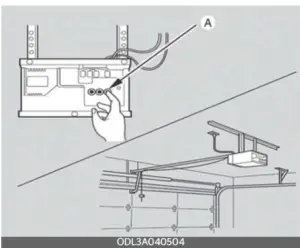 A ladder and/or second person may simplify the following steps.
A ladder and/or second person may simplify the following steps. - Firmly press and release the “Learn” ,”Smart”, “Set” or “Program”” buttons. You now have up to 30 seconds in which to complete the next step.
- Return to the vehicle and firmly press, hold for two seconds and release, the HomeLink button up to three times in a row slowly. Do not press the Home-Link button rapidly. As soon as you see the garage door start to move, stop pressing any buttons until a few seconds after the garage door has come to a complete stop, regardless of position. At this point programming is complete and your device should operate when the HomeLink button is pressed and released.
Two-Way Communication Programming (For select garage door openers)
If your garage door opener has the ‘myQ’ logo on its side, your opener has Two-Way Communication capability. HomeLink has the capability to establish Two-Way Communication with your garage door opener. HomeLink can receive and display “closing” or “opening” status messages from compatible garage door openers. At any time, HomeLink can also recall and display the last recorded status communicated by the garage door opener to indicate your garage door being “closed” or “opened”.
To check if your garage door opener is compatible with this feature, refer to www.homelink.com/compatible/Two-way-Communication. If your garage door opener has this functionality, AND the Two-Way Communication indicators (4), (6) in the mirror appear while the garage door is opening/closing, then no further steps are needed. Two-Way Communication Programming is already complete. However, if your garage door opener has this functionality, AND the Two-Way Communication indicators (4), (6) in the mirror DO NOT appear while the garage door is opening/closing, use the following instructions to enable this functionality.
- In your vehicle, press and hold the programmed HomeLink button for 2 seconds, then release. Confirm that the garage door is moving. AFTER it stops, you will have one minute to complete the following steps:
- A ladder and/or second person may simplify the following steps.
- On your garage door opener in your garage, locate the “Learn” button
(usually near where the hanging antenna wire is attached to the garage door opener). If there is difficulty locating this button, refer to the device’s owner’s manual. - Press and release the “Learn” button.
- A light on your garage door opener may flash, and your Two-Way Communication indicators (4), (6) in your vehicle may flash, confirming completion of the process.
- Return to the vehicle and firmly press and release the programmed Home-Link button to activate your garage door. The Two-Way Communication indicators (4), (6) flash in orange when the door is moving. Do not make any additional button presses until AFTER the garage door has come to a complete stop.
- Your Two-Way Communication programming is now complete.
NOTICE
If your garage door opener has Two-Way Communication functionality, it is possible for HomeLink to stop function-ing the garage door shortly after initial programming, if the Two-Way Communication Programming wasn’t properly completed. This usually happens after the first 10 times a programmed Home-Link button is pressed. If you experience this, completing the “Programming a New HomeLink Button” and “Two-Way Communication Programming” will restore door operation.
Canadian Programming
Canadian radio-frequency laws require transmitter remote signals to “time-out” (or quit) after a couple of seconds of transmission, which may not be long enough for HomeLink to pick up the signal during programming.
If you live in Canada or you are having difficulties programming a gate operator or garage door opener by using the programming procedures, replace “Programming a New HomeLink Button” step 3 with the following:
While the HomeLink indicator light (7) is flashing orange, press and release
(“cycle”) your device’s hand-held remote every two seconds until the HomeLink indicator light (7) changes from orange to green. You may now release the hand-held remote button. Then proceed with “Programming a New HomeLink Button” step 4.
Operating HomeLink씾1)
Operating HomeLink씾
- Press and release the desired programmed HomeLink button (1, 2 or 3).
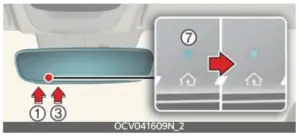
NOTICE
The HomeLink indicator (7) should light green, solid or flashing, and your programmed device should operate.
If your device does not operate, the HomeLink programming was not successful, and you’ll need to reprogram the button.
2023 KIA SPORTAGE Specs, Price, Features and Mileage (Brochure)
Two-Way Communication Dis-play Behavior
- Press and release one of the programmed HomeLink buttons (1, 2 or 3)
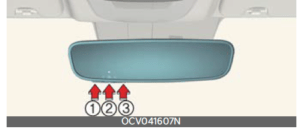
- Indicators (4) and (6) operate as below, if your garage door opener has Two-Way Communication functionality
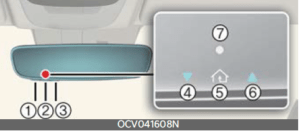
- If the indicator (4) flashes in Orange, it indicates that the garage door is “Closing”.
- The indicator (4) turns solid green once the garage door has closed.
- If the indicator (6) flashes in Orange, it indicates that the garage door is “Opening”.
- The indicator (6) turns solid green once the garage door has fully opened.
- If the indicator (4) or (6) does not turn to green, it indicates that the last status of the garage door was not received properly. The HomeLink mirror tries to receive the last known status of the garage door for a few seconds.
Recalling Garage Door Status
HomeLink mirror with Two-Way Communication provides a way to view the last stored message from the garage door opener. In order to recall the last known status of the last activated device, press the buttons “1 and 2” OR “2 and 3” simultaneously.
- If indicator (4) appears solid Green, it indicates that the last activated device was properly “closed”.
- If the indicator (6) appears solid Green, it indicates that the last activated device was properly “open”.
Erasing HomeLink씾 Buttons
Erasing and Reprogramming a Single HomeLink씾 Button:
- Press and hold the desired HomeLink button you want to re-program. DO NOT release the button.
- The HomeLink indicator light (7) will begin appear solid green. Release the button as soon as the HomeLink indicator light (7) begins to flash orange, usually about 20 seconds.
- Proceed with the steps in the “Programming a New HomeLink Button” section.
NOTICE
If you do not complete the re-programming of a new device to the button, it will revert to the previously stored programming
The following instructions will erase ALL HomeLink씾 programming from ALL buttons:

- Press and hold the buttons (1) and (3) simultaneously
- The HomeLink indicator light (7) will appear solid Orange for about 10 seconds
- Release the buttons once the Home-Link indicator light (7) changes to Green and flashes rapidly
- Now all three HomeLink buttons (1), (2) and (3) are cleared of any programming
Information
HomeLink and the HomeLink House logo are registered trademarks of Gen-tex Corporation.
The myQ logo is a registered trademark of The Chamberlain Group, Inc
FCC (USA) and ISED (Canada)
This device complies with FCC rules part 15 and Innovation, Science, and Economic Development Canada RSS-210. Operation is subject to the following two conditions: (1) This device may not cause harmful interference, and (2) This device must accept any interference that may be received including interference that may cause undesired operation. WARN-ING: The transmitter has been tested and complies with FCC and ISED rules. Changes or modifications not expressly approved by the party responsible for compliance could void the user’s authority to operate the device.
This equipment complies with FCC and ISED radiation exposure limits set forth for an uncontrolled environment. End Users must follow the specific operating instructions for satisfying RF exposure compliance. This transmitter must be at least 20 cm from the user and must not be co-located or operating in conjunction with any other antenna or transmitter
HomeLink 5 Programing Flow Chart
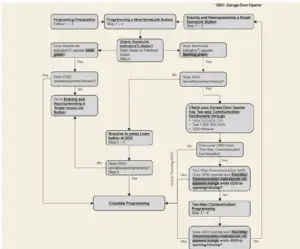
Outside rearview mirror
Your vehicle is equipped with both left-hand and right-hand outside rear-view mirrors.
Be sure to adjust the mirror angles before driving.
The mirrors can be adjusted remotely with the control levers or remote switch, depending on the type of mirror control installed. The mirror heads can be folded back to prevent damage during an automatic car wash or when passing through a narrow street.
NOTICE
Rearview mirrors
- The outside rearview mirror is convex. Objects seen in the mirror are
closer than they appear. - Use your interior rear-view mirror or direct observation to determine the actual distance of following vehicles when changing lanes.
CAUTION
Do not scrape ice off the mirror face; this may damage the surface of the glass. If ice should restrict the movement of the mirror, do not force the mirror for adjustment. To remove ice, use a deicer spray, or a sponge or soft cloth with warm water.
CAUTION
If the mirror is jammed with ice, do not adjust the mirror by force. Use an approved spray deicer (not radiator antifreeze) to release the frozen mechanism or move the vehicle to a warm place and allow the ice to melt.
WARNING
Do not adjust or fold the outside rearview mirrors while the vehicle is moving. This could result in loss of control, and an accident which could cause DEATH, SERIOUS INJURY, or property damage.
Adjusting the outside rear-view mirrors
The electric remote control mirror switch allows you to adjust the position of the left and right outside rearview mirrors.
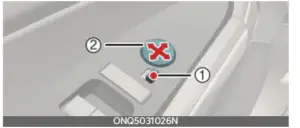
Adjusting the rearview mirrors:
- Move the R or L switch (1) to select the right side mirror or the left side mirror.
- Press a corresponding point on the mirror adjustment control (2) to position the selected mirror up, down, left or right.
CAUTION
- The mirrors stop moving when they reach the maximum adjusting angles, but the motor continues to operate while the switch is pressed. Do not press the switch longer than necessary, the motor may be damaged.
- Do not attempt to adjust the outside rearview mirror by hand. Doing so may damage the parts.
- Folding the outside rearview mirror
To fold the outside rearview mirror, grasp the housing of the mirror and then fold it toward the rear of the vehicle.
Reverse parking aid function (if equipped)
When you shift the gear to the R (Reverse) position, the outside rear view mirror(s) will rotate downwards to aid with driving in reverse.
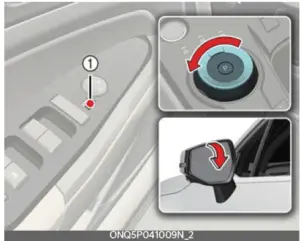
The position of the outside rearview mirror switch (1) determines whether or not the mirrors will move:
Left/Right: When either the L (Left) or R (Right) switch is selected, both outside rearview mirrors will move.
Neutral: When neither switch is selected, the outside rearview mirrors will not move.
The outside rearview mirrors will automatically revert to their original positions if any of the following occur:
- The ignition switch or ENGINE START/ STOP button is placed to either the LOCK/OFF position or the ACC position.
- The gear is shifted to any position except R (Reverse).
- The remote control outside the rearview mirror switch is not selected.
Auto reverse user settings
If you cannot secure enough visibility with the angles provided as factory default conditions, you can readjust and store the angles of outside rearview mirrors.
The factory default angles of the right and left rearview mirrors might be set differently to improve visibility.
- Set the shifter dial to P (Parking). Make sure that the vehicle is stopped and the mirrors are not working.
- Position the lever to L (left) or R (right) depending on the mirror that you want to adjust.
- Step on the brake pedal and shift the shifter dial to R (Reverse).
- When the downward movement of the rearview mirror is finished, adjust the mirror to the desired angle by pressing the switches, ▼, ▲, ◀, ▶.
- If you shift the shifter dial to a position other than R (Reverse), or change the rearview mirror selector lever to the neutral position, and the automatic return of the mirror is finished, the adjusted angle will be automatically saved.
- You can adjust the rearview mirror on the other side by following the same procedures (1-5).
How to reset auto reverse user settings
If you want to change the automatic control function of rearview mirrors to factory-default conditions, follow the steps below.
- Shift the shifter dial to P (Park). Make sure that the vehicle is stopped and the mirror is not working.
- Choose the mirror to be adjusted by positioning the lever to L (left) or R (right).
- Step on the brake pedal and shift the shifter dial to R (Reverse).
- When the downward movement of the rearview mirror is finished, press the switch ▲ to locate the mirror in a position higher than before (P, N or D).
(Adjust the mirror in a higher position compared to its position in the driving mode) - It is initialized when the shifter dial is shifted to a position other than R
(Reverse), or the rearview mirror selector lever is changed to the neutral position. (Initialized position will be applied from next operation) - You can initialize settings for the mirror on the other side by following the same procedures (1-5).
CAUTION
We recommend following the procedures in an orderly manner to change or initialize the auto-reversing user settings.
If you move to the next step before completing the previous one, the changed angle may not be changed or initialization may not work properly.
FAQ
A: The Sportage PHEV typically features a multifunctional steering wheel with various controls for convenience and safety.
A: Yes, the steering wheel is often adjustable for both tilt and telescopic positions, allowing you to customize its position for comfort.
A: The steering wheel controls often include functions for audio, phone calls, cruise control, and sometimes even vehicle information displays.
A: You can usually adjust the steering wheel’s position by using the adjustment lever or button located on the steering column.
A: Yes, power-adjustable side mirrors are typically featured in the Sportage PHEV, allowing you to control their position electronically.
A: Many vehicles, including the Sportage PHEV, often have power-folding mirrors that can be folded in electronically for parking or in tight spaces.
A: Yes, side mirrors with heating elements are common in many vehicles, helping to prevent frost and improve visibility in cold weather.
A: Yes, you can typically adjust the side mirrors to reduce blind spots by angling them outward to cover a wider field of view.
A: Yes, the Sportage PHEV often includes an auto-dimming rearview mirror that dims automatically when it detects glare.
A: The auto-dimming feature is often activated automatically when the vehicle’s sensors detect glare from headlights behind the vehicle.
A: Some vehicles allow you to adjust the rearview mirror’s dimming level manually using a control on the mirror.
A: Regularly cleaning and inspecting the mirrors for damage or obstructions is recommended to ensure clear visibility.
A: While some vehicles offer this feature, it may not be standard in all Sportage PHEV models. Refer to the owner’s manual for details.
A: Some vehicles offer memory settings for mirror positions, allowing multiple drivers to have their mirror preferences stored.
A: Some Sportage PHEV models may offer blind-spot monitoring systems that include indicators in or near the side mirrors to alert you to vehicles in your blind spots.
Useful Link
View Full User Guide: Kia Sportage PHEV 2023 User Guide
Download Manuals: https://owners.kia.com/content/owners/en/manuals.html
2023 KIA SPORTAGE Specs, Price, Features and Mileage (Brochure)



